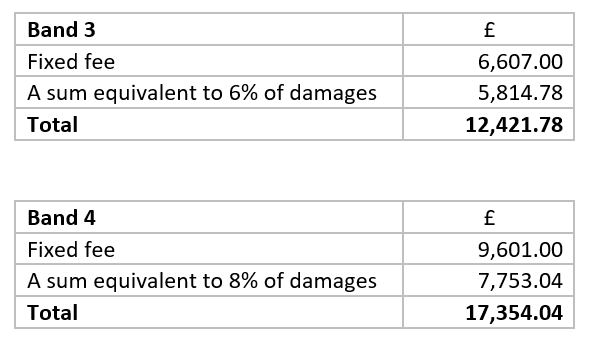FAST TRACK COSTS CAN BE 10 TIMES HIGHER THAN INTERMEDIATE TRACK!
Having tried dozens of different examples, it is clear that in many cases, both civil and personal injury, the fees are higher in the Fast Track as compared with the Intermediate Track for the same case.
This is for various reasons:
(i) The key stage of the Fast Track is issuing proceedings, where there is a sharp jump in fees, and indeed that has been the case for the last ten years;
(ii) In the Intermediate Track, that stage is the service of the Defence, which is obviously later;
(iii) The inflexible nature of the Fast Track as compared with the flexible nature of the Intermediate Track, which means there is certainty in the Fast Track as to the Band;
(iv) The very high percentage of damages calculation of fixed fees in Band 4 of the Fast Track — 48% including VAT.
This is so counter-intuitive, that I have several times gone back to the actual Rules to check it was not a mistake or a typo!
Let us ignore any issue of whether the court will agree to put into the Fast Track matters which on the face of it are financially in the Fast Track on one hand, or the Intermediate Track on another.
Thus, we have a straightforward Road Traffic Accident, and one case is worth £24,000 and is Fast Track and the other is £26,000 and thus is Intermediate Track, although of course it will probably be allocated to the Fast Track.
It is issued and settles before trial.
The Fast Track calculation is as follows:

Intermediate Track – almost certainly Band 1

Even if it would be allocated to Band 2 in the Intermediate Track — very unlikely if it is settled before the Defence is served, then you hardly lose out as the calculation would be:

If that £26,000 claim was in the Fast Track, then the figures are as follows:

Thus, even if the matter was in Intermediate Band 2, you are only £77 better off in the Intermediate Track.
Because of the high percentage figure in the Fast Track, lawyers are better off in the Fast Track, the higher the damages!
Of course, if a Defence is served pushing the matter into Stage 3 of the Intermediate Track, then you rely on the value of any claim over £25,000 to seek to get it into the Intermediate Track.
In a personal injury case, I think it very hard indeed for a defendant who never receives costs, due to QOCS, to seek to argue that it should be in a higher track than that proposed by the claimant.
They may try to do so but yet again, that is highly counter-intuitive and may not find favour with the courts.
Let us look at the facts of a particular case brought to my attention.
The balance outstanding and recovered by the claimant was £96,913.
Let us assume that the matter is allocated to Band 1, 2,3 or 4 of the Intermediate Track and is resolved after proceedings have been issued, but before a Defence is served.
Fixed Recoverable costs are as follows:
Intermediate Track:

Even if the matter was at Band 2 one, the calculation is as follows:

If the matter was assigned to Band 3, or Band 4 the calculations are as follows:

In Band 4 of the Fast Track the Fixed Recoverable Costs would be as follows:

All these figures have VAT on top.
This is bizarre, and presumably completely unintended, and arises from the very high percentage of damages in Band 4 of the Fast Track, 40% plus VAT, and as the damages do not have VAT on them, this equals 48% of damages.
Thus, depending on which band the matter went into in the Intermediate Track, and adding VAT, the minimum advantage in being in the Fast Track is £29,409.80, and the maximum is £44,821.96.
Thus, by being in the Fast Track, you will receive over twice as much as if the matter was in Band 4 of the Intermediate Track and very nearly 10 times as much if it is in Band 1 of the Intermediate Track!
Thanks, Kerry, this is very interesting indeed. Costs really are a minefield for the unwary.
If I may, I would like to ask you for your thoughts in relation to costs in a clinical negligence claim involving right to life issues. Proceedings have yet to be issued, and time is running out for the right to life claim. I realise that QOCS will apply to the clinical negligence aspect. Also, as the injury occurred in August 2023, the fixed costs regime will not apply. However, my concern is the danger that the right to life claim may not succeed, whereas the clinical negligence claim is rather more straightforward. The factual basis for both of these claims is very similar. If it were you, how would you approach the proceedings in order to minimise the risk of an adverse costs order in relation to the right to life aspect?
jankumar1b32e402c3b
June 25, 2024 at 2:08 pm
Thank you for your comment.
I cannot advise via a blog on any individual cases, and this particular one is complicated.
I am more than happy to deal with this in a formal way as a solicitor advising you on this matter.
If you wish to go ahead on this basis, and wish to discuss fees etc, then please email me on kerry.underwood@lawabroad.co.uk or contact me on 01442 430900.
Kerry
kerryunderwood
June 26, 2024 at 11:22 am
[…] kerryunderwood.wordpress.com/2024/06/25/fast-track-costs-can-be-10-times-higher-than-intermediate-tr… […]
Costs: FAST TRACK COSTS CAN BE 10 TIMES HIGHER THAN INTERMEDIATE TRACK! – Pete's Library
June 25, 2024 at 11:06 pm